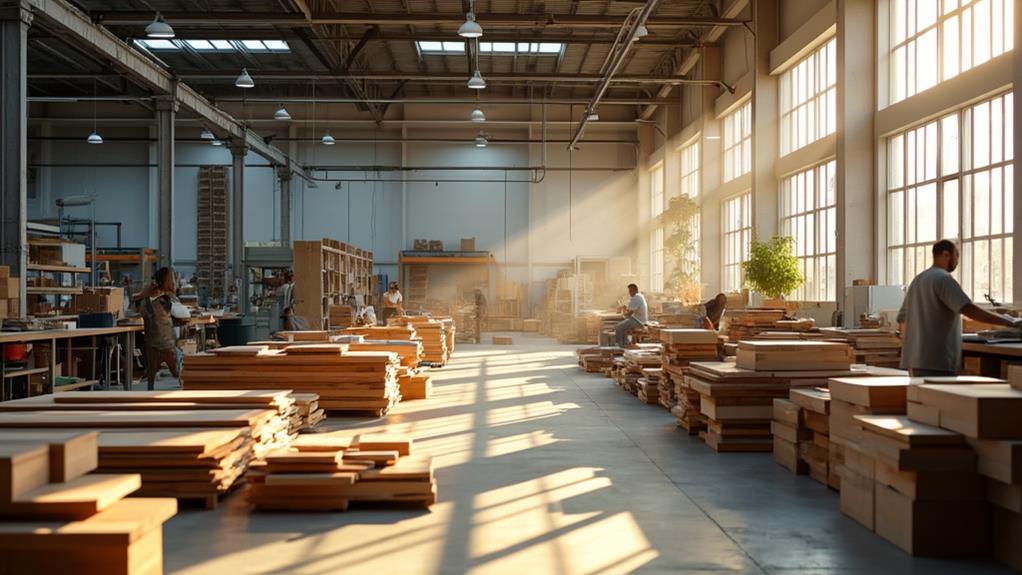We've mastered cost efficiency in furniture production by refining procurement and production processes, which boost financial efficiency through optimized raw material acquisition and resource utilization. Understanding market trends helps us adjust our budgets, while technology integration and automation reduce labor costs and improve production precision. Employing sustainable material sourcing guarantees high-quality, eco-friendly supplies and recycling initiatives help lower disposal fees. Streamlining manufacturing phases, minimizing waste, and adapting cross-trained workforces increase efficiency. By leveraging these strategies, we consistently maintain cost controls and produce flexible, durable furniture. Exploring these facets further reveals the nuances of our approach to mastering cost efficiency.
Table of Contents
ToggleEffective Cost Management
Effective cost management is vital for maintaining a competitive edge in the furniture industry. We need to refine our procurement and production processes to improve financial efficiency.
By closely monitoring market trends for raw material pricing, we can optimize our budgets and identify cost-saving opportunities. Implementing waste reduction and recycling initiatives not only minimizes disposal fees but also lowers production costs, contributing to long-term financial health.
Technology plays an essential role in reducing labor costs and enhancing production efficiency. By integrating sustainable practices, we attract eco-conscious consumers, potentially boosting sales.
Furthermore, efficient resource use directly translates to significant savings. Let's focus on these strategies to guarantee we're managing costs effectively and maintaining a strong position in the market.
Sustainable Material Sourcing
Harnessing the power of sustainable material sourcing is key to balancing cost and quality in our production processes. By partnering with reliable suppliers, we guarantee our materials not only meet high-quality standards but also adhere to environmental practices.
Regular supply chain evaluations allow us to maintain these standards, aligning with our commitment to sustainability. We've found that investing in eco-friendly resources can lead to long-term financial benefits, as waste reduction directly translates to cost savings.
Additionally, recycling initiatives help lower disposal fees. By staying informed about market trends, we can optimize our material budgets, further enhancing our cost efficiency.
In doing so, we not only appeal to eco-conscious consumers but also fortify our commitment to responsible production.
Optimizing Manufacturing Processes
Our commitment to optimizing manufacturing processes is at the heart of our quest for efficiency and sustainability. By analyzing each production phase, we identify inefficiencies and streamline operations to reduce costs and waste.
We focus on environmentally friendly methods to minimize carbon emissions, guaranteeing that our practices align with sustainable goals. Maximizing resource utilization, such as the efficient use of solid wood, directly lowers production expenses.
Additionally, reusing offcuts for smaller items or seasonal decor allows us to minimize waste, contributing to cost savings. Collaborating with interior designers guarantees our furniture remains flexible and durable, meeting high-quality standards.
Through these efforts, we enhance our operational flow and maintain high-quality outputs, reinforcing our dedication to both efficiency and sustainability.
Embracing Technology and Automation
Integrating advanced technology and embracing automation revolutionize how we approach furniture production. By incorporating the TLG model, we can evaluate our operations and pinpoint areas ripe for technological improvements.
Automation minimizes manual labor and reduces human error, enhancing precision and efficiency across production lines. Through real-time data analysis, we restructure procurement and distribution processes, ensuring swift, informed decisions.
Energy-efficient technologies not only lower our carbon footprint but also align with consumer interest in eco-friendly products. This balance of economic and environmental considerations allows us to stay competitive.
As we integrate these advancements, our ability to maintain high-quality outputs while controlling costs becomes evident, making technology and automation indispensable to our strategic goals in furniture manufacturing.
Enhancing Workforce Efficiency
In today's competitive market, boosting workforce efficiency is essential for maintaining a successful furniture production operation. We must align employee skills with technological advancements to maximize productivity.
Cross-training plays a critical role, allowing our team to adapt to varying production needs and reducing downtime. Adopting lean manufacturing principles helps eliminate waste, streamlining processes for better output.
Organizing production phases efficiently guarantees tasks are distributed effectively, minimizing bottlenecks. Additionally, creating ergonomic workspaces enhances employee well-being, reducing the risk of injury and improving morale.
Leveraging Recycling Initiatives
Although recycling initiatives might seem like a challenging task, they offer significant cost-saving opportunities and environmental benefits for our furniture production.
By integrating recycling processes, we can transform waste materials into valuable resources, reducing both disposal fees and raw material costs. For instance, reusing wood offcuts for smaller products or decor not only maximizes resource use but also minimizes waste.
This approach helps decrease our environmental footprint, aligning with sustainable practices that appeal to eco-conscious consumers. In addition, recycling initiatives foster a culture of innovation, encouraging us to explore new methods for waste reduction.
As we continue to refine these practices, we can achieve long-term financial health while enhancing our brand's reputation for sustainability. Let's embrace recycling as a strategic advantage.
Brand Commitment and Contact Information
Recycling initiatives not only enhance our sustainability efforts but also reflect our brand's commitment to responsible production practices.
We prioritize quality and sustainability, guaranteeing our furniture supports eco-friendly and cost-efficient goals. Our dedication extends to transparent communication and customer engagement.
Here's how we embody this commitment:
- Artisan Furniture™: A hallmark of quality, aligning with environmental standards.
- Location: Our office is situated at 2A, Monck St, Westminster, London SW1P 2BQ.
- Contact: Reach us at 0800 689 4736, Monday to Friday, 9 am to 5 pm.
- Email: For inquiries, contact us at mail [at] artisanfurniture.net.
- Sustainability: Upholding eco-conscious practices without compromising on quality.
Our brand's commitment guarantees not just superior products but also a responsible approach to production and customer service.


